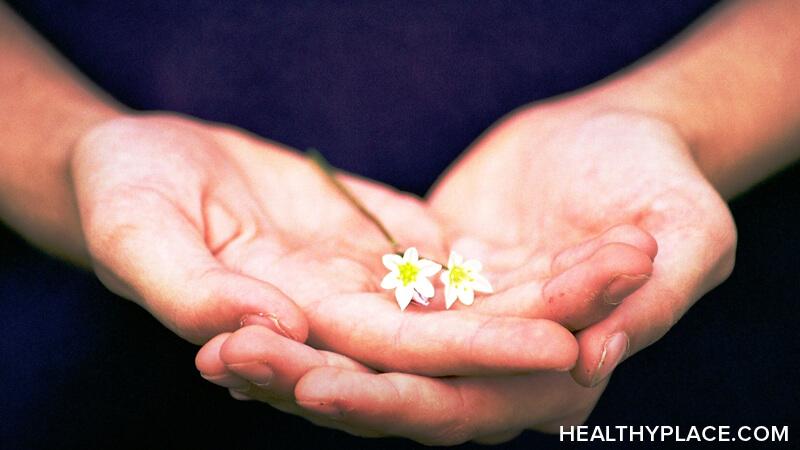Gratitude and Anxiety: To Be Less Anxious, Be More Grateful

Gratitude and anxiety can seem like an unlikely combination. People living with any type of anxiety might be prone to see gratitude as a superficial trend and interpret reports that it reduces anxiety as pure nonsense. That skepticism makes a lot of sense. When you're worried about a loved one's health, for example, does thanking the person who coughed germs all over the room help your anxiety? Honestly, it probably would not. That, though, isn't what gratitude is all about. Gratitude and anxiety have a genuine connection, and the more you know about it, the more you'll find yourself less anxious and more grateful.
Anxiety, Gratitude, and the Brain
Our thoughts, emotions, and behaviors are brain-based, including anxiety and gratitude. Both of these states are tied to activity in the brain such as the production and functioning of neurotransmitters like dopamine, norepinephrine, and serotonin and hormones like cortisol. Even when our anxiety is triggered by situations or people, it's the neural activity that causes our reaction.
Anxiety, fear, worry, and the brain gang up on us and train us to be on the lookout for the negative and for problems. We find them. We react to them anxiously because our brain is conditioned that way. It's not intentional but, rather, is a habit that formed without us being aware until anxiety symptoms became prominent and bothersome.
Gratitude works in a similar, but opposite, fashion. Studies have shown that gratitude reduces anxiety (depression, too) in part by optimizing the functioning of the autonomic nervous system as well as those same neurotransmitters involved in anxiety.1
The brain can't respond to anxiety and gratitude at the same time, which means it's one or the other. We can feel anxious and other negative states, or we can feel grateful and all of the positive emotions that are associated with it. We certainly do not choose to be anxious, but we can learn to control, and thus choose, our responses to what's happening in our lives.
Tips for Cultivating Gratitude to Replace Anxiety
Both anxiety and gratitude are outlooks, perspectives on yourself, your life, and people in your life. Anxiety's outlook is negative while gratitude's is positive. Both have a degree of realism (nothing is either all negative or all positive, after all).
The goal in cultivating gratitude is to train your brain to hone in on the good. Then, stick with it. Pay attention to it on purpose. Be mindfully present with it. The longer you do this, the weaker anxiety, fear, and worry become. Even better, you become increasingly more positive and appreciative of the good in your life. You don't have to ignore reality; instead, you choose what part of reality you take in.
This takes practice because anxiety is used to dictating what your pay attention to as well as your perspective. It's a matter of patience and persistence as you develop a sense of gratitude to replace anxiety. Here are a few tips:
- Find beauty and pause to simply appreciate it.
- Keep a gratitude journal, adding quick notes about your day every day.
- Pair deep breathing with visualizing an image of something for which you're glad.
- Write little notes of appreciation of others and leave them where people with find them.
- Acknowledge anxious thoughts and add, ". . . and right now I appreciate_____."
- Give yourself permission to be grateful rather than letting worry push it away.
- Appreciate things about yourself.
- Throughout the day, just pause briefly and appreciate something in that moment.
Cultivate the perspective you want to have, even when you're anxious--especially when you're anxious. It's a powerful way to disrupt anxious thoughts, worries, fears, and obsessions. You can't control many things that happen, things that are legitimately anxiety-provoking; however, you can control how you respond. The more you respond by finding things for which to be grateful, the more you'll strengthen positive responses in your brain. You'll be happy to find that your anxiety has been replaced. That is something to be thankful for.
Sources
- Chowdhury, M., "The Neuroscience of Gratitude and How it Affects Anxiety & Grief." PositivePsychology.com, April 7, 2019.
- Socha, B., "Gratitude to Relieve Anxiety." Anxiety Relief Project, December 10, 2018.
APA Reference
Peterson, T.
(2019, November 14). Gratitude and Anxiety: To Be Less Anxious, Be More Grateful , HealthyPlace. Retrieved
on 2025, November 25 from https://www.healthyplace.com/blogs/anxiety-schmanxiety/2019/11/gratitude-and-anxiety-to-be-less-anxious-be-more-grateful
Author: Tanya J. Peterson, MS, NCC, DAIS
Oh my Goodness!
Thank you. However, I wished I’d found this sooner.
Since retirement, Covid, husband with cancer (although now given the all-clear), grownup daughter and child, having lived with us for 7 years, has moved out, for all these reasons and more, I’ve become anxious. At times it seems to be dominating my life and affecting relationships.
I wish I’d seen this sooner.
Thank you.
N